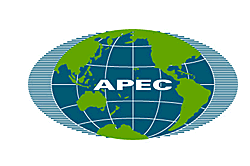



For Teachers There is no doubt that Asia Pacific is an important region for students to explore. International bodies, such as APEC, are increasingly affecting our daily lives. With Canada chairing APEC during 1997, this site has been created by youth involved in the year's events, culminating in the up-coming APEC Economic Leaders' Meeting in Vancouver this November.
The content for this web-site has been developed by TG Magazine/The Students Commission's Asia Pacific Youth Coordination Team. All of the APEC youth reports and recommendations were created by the hundreds of Canadian and international youth who participated in the various APEC Ministerial and Working Group Meetings hosted in Canada during 1997 - Canada's Year of Asia Pacific (CYAP).
This site had been designed to be informative, educational and FUN!! It can be used in many ways in the classroom and integrated into a variety of curriculum areas. Whether you are teaching social studies, history, geography, political science, economics, environmental studies, or Asian studies...there is something on this site for you.
This learning resource is unique in that it brings international issues to life for young people because it focuses on their involvement in the APEC process this year.
You can use this site as a resource to complement your already existing curriculum and programming, or use it as a stand-alone unit on APEC.
Using the "Issues" page included in each of the Ministerial modules, some possible learning activities could include: in-class discussions, APEC simulations, written assignments and debates.
Discussion questions are also incorporated into each of the Ministerial modules "issues" pages. Students can share the results of in-class discussions by posting them to our electronic discussion forums. This may in turn stimulate further discussions on hot topics with other young people across the country or even around the world. To learn how to use the electronic discussion forums, click here.
To provide students with more opportunities to experiment with information and communication technologies and to enhance their research skills, links to relevant APEC related web-sites are available for browsing.
Come discover APEC and the Asia-Pacific region!!
Experience Asia by visiting the Asia Connects Virtual Conference!
How to use the Discussion Forums
The Discussion Forums serve two purposes:
1. The Discussions Forums are places where all Asia Connect virtual conference participants can write comments, questions, and your views about what you are reading, learning and experiencing. What are the things you agree with? What are the things you disagree with?
You can also read and comment on what others are saying and carry on an asynchronous (at different times) discussion with other participants from different parts of the world at different times, day and night.
2. The Discussion Forums are places to post your recommendations and ideas on each module topic.
Step-by-step process
1. Follow the link to the Discussion Forums from Post your comments and ideas link on each page.
2. A frame screen (a screen divided into two) will appear. Select the language of your choice, then choose whatever topic you would like to comment on. For example, if you have comments on the Energy Issues, you can post them in the Energy Issues discussion.
3. Participants from all of the Canada's Year of Asia Pacific events have been using the discussion forums all year to help build their recommendations. Don't be put off by some of the complex language and concepts that they are using. Some of the participants have been university students specializing in the topic areas. The discussion forum is for everyone and we encourage people of all ages and all areas of study to post!
4. Once you select the discussion you want, enjoy reading the comments of others, and then adding your own comment in the text box at the bottom of your screen along with your name.
5. When you are finished writing your comment, simply click on the 'Submit' button to post your comments in the forum for others to read.
Ready to try it out?
© 1997 - TG Magazine / The Students Commission
© 1997 le magazine TG / la Commission des
Ètudiants